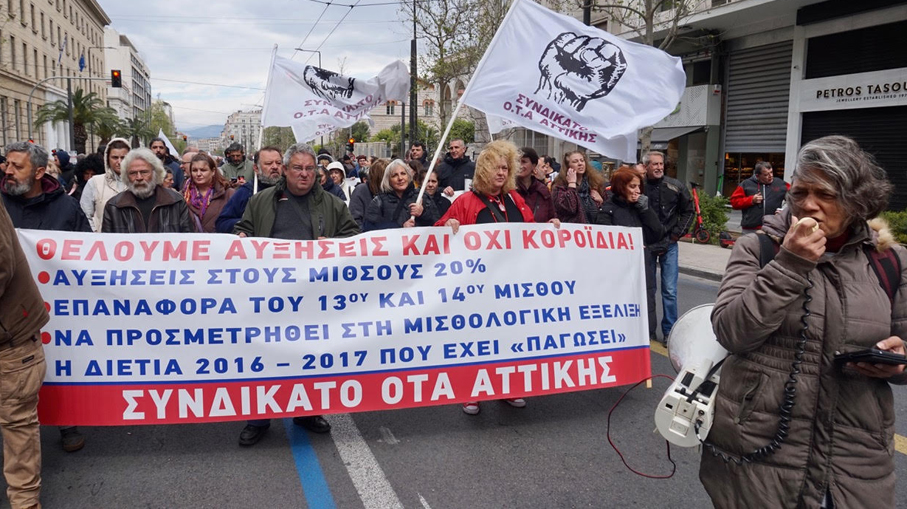
A 24-hour General Strike declared by GSEE (Greek TUC) and ADEDY (public sectors trades unions federation) took place on Wednesday in Greece, with the main demands being wage and pension increases and collective labour agreements for all.
Strike rallies were organised in all Greek cities.
Approximately 20,000 workers with large student contingents participated in three different strike marches in Athens, by the GSEE, the Communist Party’s trade union section PAME, and by the left Trade Union branches.
ADEDY held a small rally outside the Ministry of Finance demanding the reinstatement to public sector workers of the so-called 13th and 14th salaries, every spring and end of the year, still payable to private sector workers.
In the northern metropolitan city of Thessaloniki, about 10,000 workers and students marched through the city centre – reports Mary Kekhaghia.
Demonstrators chanted slogans against poverty and privatisations and held the Mitsotakis regime responsible for the Tempi train crash, of two years ago, which killed 57 passengers.
In the port and industrial city of Piraeus, a few hundred workers took part in the strike rally and march.
Yet participation to the strike was 100% throughout the port and on the ship-repairs section.
Seafarers’ strike was solid and no ferries sailed in or out of Greek ports.
Likewise solid was the strike in the media; no newspapers were published and no news programmes were broadcast on television and radio. 100% participation to the strike was reported in construction and on the morning and evening 4-hour stoppages on the Athens-Piraeus public transport.
In all other public and private sectors, the participation to the strike was limited.
The PAME’s march was by far the largest of the strike’s marches in Athens last Wednesday, with over 10,000 workers and a large bloc of students.
There were many delegations from industrial trade unions (construction, metal, apparel, energy, press, tourism, food), from local government, telecommunications, shop assistants and some branches of civil servants, hospital and teachers.
They shouted ‘their profits or our lives’.
At the PAME rally the General Secretary of the KKE (Greek Communist Party) D. Koutsoubas stated: ‘We demand that wage increases must be handed by the government to pensioners and workers, that the 13th and 14th salaries be restored to relieve households.’
The KKE leadership believe in pressure on Mitsotakis regime at a time when the Greek Prime Minister announced a 25-28 billion euros rearmament programme which include big salaries rises for all military, police and the hated armed riot police, while the bosses offer a 2.5% wage increase to workers, less that the 3.1% inflation rate.
Those 25-28 billion euros mean starving wages and barbaric attacks and privatisations on public health, educations and services with tens of thousands of sackings in the civil service and local government.
The GSEE Athens march, of about than 3,000 workers, included small contingents from some Labour Trade Councils, electricity and transport workers, plus teachers’ and hospital trades unions branches.
They were joined by contingents of some small left- wing parties, and by SYRIZA.
At the tail of the march was a large bloc of the Athens Tenants’ Base Trade Union of youth demanding housing and affordable rents.
The left Trade Unions branches march, also 3,000 strong, included teachers and hospital trade unions, university students and contingents of small left wing parties and anarchist groups.
Despite the enthusiasm and continuous anti-government slogans chanting by the teachers’ branches and by the university students contingents, Wednesday’s Athens strike marches hardly reflected the huge anger and class hatred of the working class and youth in Greece against the Mitsotakis regime.
There were two or three trade union branches’ banners declaring opposition to NAT wars and for the liberation of Palestine, yet the marches’ organisers were not that concerned of the EU’s and NATO’s wars.
Strike rally speakers hardly made references to US President Trumps’ war on American workers and his world tariffs war stemming from the insoluble world crisis of capitalism.
The rallies and marches in Athens remained protest mobilisations, as the trade unions leaders and the leaderships of KKE – PAME refuse to declare war on the intensified austerity of the Mitsotakis regime.
Last January and February, hundreds of thousands took part in Athens rallies which accused the Mitsotakis government for the crime of the Tempi train crash and demanded he should go.
Only a fraction of those hundreds of thousands demonstrated last Wednesday and this is because the trade unions and the KKE leaders refused to make the strike rallies manifestations of workers’ will to get rid of Mitsotakis.
The prospect of the overthrow of the government is the unified force which could mobilise the hundreds of thousands to fight head on the Mitsotakis regime.